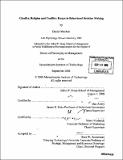Giraffes, religion and conflict : essays in behavioral decision making
Author(s)
Mochon, Daniel
DownloadFull printable version (8.185Mb)
Other Contributors
Sloan School of Management.
Advisor
Dan Ariely and Shane Frederick.
Terms of use
Metadata
Show full item recordAbstract
Essay 1: Objective Scale Anchoring in Sequential Judgments We explore the scope and boundary conditions for anchoring when respondents render sequential judgments in the absence of an explicit comparative standard. We show that previous judgments can anchor subsequent ones, even when these are not explicitly compared. We then demonstrate that the effect is caused by the reinterpretation of objective response scales. Much like the use of the label 'very heavy' will depend on its context, we show that the use of labels such as '1000 pounds' will also depend on context. Even though the pounds scale is objectively defined, psychologically it still must be interpreted, and is subject to similar effects as those that influence subjective scales. Essay 2: The Impact of Regular Activities on Well-being Because of people's tendency to adapt, few events in life have a lasting impact on subjective well-being. We suggest that while major events may not provide lasting increases in well-being, certain seemingly minor events - such as attending religious services or exercising - may do so by providing small but frequent boosts. In two studies we demonstrate the existence of such boosts to well-being, and provide evidence that these boosts may be cumulative. We suggest that shifting focus from the impact of major life changes on well-being to the impact of seemingly minor repeated behaviors is crucial for understanding how best to improve well-being. Essay 3: The Doomsday Device: A Mechanism for Avoiding Conflict Arms races are a common occurrence in the business world. In the current paper, we propose that such arms races can be avoided by the use of commitment to an extreme response, and we test this idea experimentally. (cont.) Our findings suggest that actual commitment is an effective but underused tool for avoiding the escalation of conflict. We also find that while cheap talk is not effective in the short run, it is useful for establishing a reputation for future interactions.
Description
Thesis (Ph. D.)--Massachusetts Institute of Technology, Sloan School of Management, 2008. Includes bibliographical references.
Date issued
2008Department
Sloan School of ManagementPublisher
Massachusetts Institute of Technology
Keywords
Sloan School of Management.